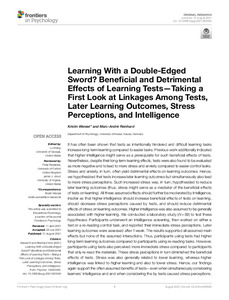| dc.date.accessioned | 2021-10-01T10:08:18Z | |
| dc.date.available | 2021-10-01T10:08:18Z | |
| dc.date.issued | 2021-08-31 | |
| dc.identifier | doi:10.17170/kobra-202110014832 | |
| dc.identifier.uri | http://hdl.handle.net/123456789/13277 | |
| dc.description.sponsorship | Gefördert durch den Publikationsfonds der Universität Kassel | |
| dc.language.iso | eng | |
| dc.rights | Namensnennung 4.0 International | * |
| dc.rights.uri | http://creativecommons.org/licenses/by/4.0/ | * |
| dc.subject | learning tests | eng |
| dc.subject | desirable difficultieseng | eng |
| dc.subject | acute stress perceptions | eng |
| dc.subject | intelligence | eng |
| dc.subject | long-term learning | eng |
| dc.subject.ddc | 150 | |
| dc.subject.ddc | 370 | |
| dc.title | Learning with a double-edged sword? beneficial and detrimental effects of learning tests—taking a first look at linkages among tests, later learning outcomes, stress perceptions, and intelligence | eng |
| dc.type | Aufsatz | |
| dcterms.abstract | It has often been shown that tests as intentionally hindered and difficult learning tasks increase long-term learning compared to easier tasks. Previous work additionally indicated that higher intelligence might serve as a prerequisite for such beneficial effects of tests. Nevertheless, despite their long-term learning effects, tests were also found to be evaluated as more negative and to lead to more stress and anxiety compared to easier control tasks. Stress and anxiety, in turn, often yield detrimental effects on learning outcomes. Hence, we hypothesized that tests increase later learning outcomes but simultaneously also lead to more stress perceptions. Such increased stress was, in turn, hypothesized to reduce later learning outcomes (thus, stress might serve as a mediator of the beneficial effects of tests on learning). All these assumed effects should further be moderated by intelligence, insofar as that higher intelligence should increase beneficial effects of tests on learning, should decrease stress perceptions caused by tests, and should reduce detrimental effects of stress on learning outcomes. Higher intelligence was also assumed to be generally associated with higher learning. We conducted a laboratory study (N = 89) to test these hypotheses: Participants underwent an intelligence screening, then worked on either a test or a re-reading control task, and reported their immediate stress perceptions. Later learning outcomes were assessed after 1 week. The results supported all assumed main effects but none of the assumed interactions. Thus, participants using tests had higher long-term learning outcomes compared to participants using re-reading tasks. However, participants using tests also perceived more immediate stress compared to participants that only re-read the materials. These stress perceptions in turn diminished the beneficial effects of tests. Stress was also generally related to lower learning, whereas higher intelligence was linked to higher learning and also to lower stress. Hence, our findings again support the often assumed benefits of tests—even when simultaneously considering learners’ intelligence and and when considering the by tests caused stress perceptions.
Notably, controlling for stress further increases these long-term learning benefits. We then discuss some limitations and boundaries of our work as well as ideas for future studies | eng |
| dcterms.accessRights | open access | |
| dcterms.creator | Wenzel, Kristin | |
| dcterms.creator | Reinhard, Marc-André | |
| dc.relation.doi | doi:10.3389/fpsyg.2021.693585 | |
| dc.subject.swd | Lernen | ger |
| dc.subject.swd | Lernzielorientierter Test | ger |
| dc.subject.swd | Stress | ger |
| dc.subject.swd | Wahrnehmung | ger |
| dc.type.version | publishedVersion | |
| dcterms.source.identifier | eissn:1664-1078 | |
| dcterms.source.journal | Frontiers in psychology | eng |
| dcterms.source.volume | Volume 9 | |
| kup.iskup | false | |
| dcterms.source.articlenumber | Article 6938585 | |



